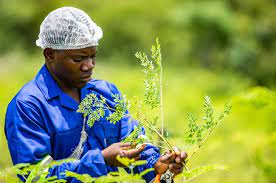The Moringa Oleifera plant, commonly referred to as the "Miracle Tree," is increasingly regarded as a beacon of hope for small-scale farmers and entrepreneurs worldwide, particularly in the realm of sustainable development and economic empowerment. With its versatile properties, rapid growth rate, and diverse applications, the Moringa plant has emerged as a promising avenue for microenterprise development. Its nutrient-rich leaves and oil-laden seeds not only offer a source of essential nutrients for human consumption but also present a unique opportunity for economic growth and community resilience. This article delves into the key role of Moringa in empowering small-scale farmers and entrepreneurs, highlighting the associated challenges, opportunities, and success stories in the growing Moringa industry.
Moringa: A Versatile Crop for Economic Empowerment
The Economic Viability of Moringa
Low Input, High Yield: Moringa thrives in various climates with minimal water and fertilizer, making it an economically viable crop for small-scale cultivation.
Market Demand: The growing global demand for Moringa products, from dietary supplements to natural cosmetics, opens up lucrative market opportunities for entrepreneurs.
Empowering Small-Scale Farmers
Agricultural Training: Providing farmers with training in Moringa cultivation techniques can significantly enhance yields and product quality, increasing competitiveness in the market.
Access to Markets: Facilitating connections between Moringa farmers and local, national, and international markets is crucial for ensuring fair prices and stable income.
Building Moringa Microenterprises: Success Stories and Strategies
From Farm to Market: Sustainable Value Chains
Cooperative Farming Models: Stories of cooperative farming groups show how collective efforts in Moringa cultivation lead to better bargaining power, shared resources, and increased profits.
Vertical Integration: Entrepreneurs who manage multiple stages of the Moringa value chain often achieve higher margins and greater business stability.
Innovation in Moringa Product Development
Local Innovation: Entrepreneurs developing innovative Moringa products tailored to local tastes and needs contribute to community health and economic resilience.
Global Trends: Tapping into global health and wellness trends with Moringa-based products allows entrepreneurs to reach a wider market, enhancing profitability.
Overcoming Challenges in Moringa Microenterprise Development
Navigating Market Access and Competition
Market Research and Branding: Effective strategies for conducting market research, developing strong branding, and differentiating Moringa products in a competitive market are essential.
Digital Marketing: Utilizing social media and e-commerce platforms can help entrepreneurs reach broader audiences and create direct-to-consumer sales channels.
Ensuring Quality and Sustainability
Certification and Standards: Obtaining quality certifications (organic, fair trade) is crucial for building consumer trust and accessing premium markets.
Sustainable Practices: Adopting sustainable farming and production practices ensures the long-term viability of Moringa microenterprises and appeals to environmentally conscious consumers.
The Future of Moringa in Empowering Microenterprise
Scaling Impact Through Collaboration and Support
Partnerships for Growth: Collaborations with NGOs, government agencies, and private sector players provide essential support services, including training, financing, and market access.
Policy Advocacy: Advocating for policies that support small-scale agriculture and microenterprise ensures that Moringa entrepreneurs have the resources and environment needed to thrive.
Harnessing Technology and Innovation
Technological Advancements: Leveraging technology to enhance efficiency and profitability in Moringa cultivation and processing can revolutionize microenterprise development.
Social Entrepreneurship: Encouraging a new generation of social entrepreneurs to view Moringa not just as a business opportunity but as a means to address nutritional, environmental, and economic challenges at the community level.
Conclusion:
Moringa Oleifera presents a unique and powerful opportunity for small-scale farmers and entrepreneurs to drive economic growth, improve community health, and contribute to sustainable development. Through innovative cultivation practices, product development, and strategic market engagement, Moringa microenterprises can flourish, offering a model for empowerment and transformation. As the global community continues to recognize the value of sustainable agriculture and natural products, Moringa stands as a testament to the power of green entrepreneurship in making a positive impact on the world.

